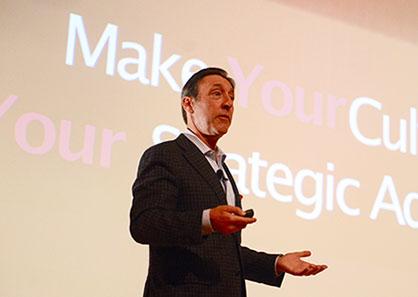Former ESPN Chairman Offers Prescriptions for Business Success
November 24, 2014

During his visit, Bodenheimer met with faculty and students. He shared insights in several classes and in a professional development seminar. And he participated in the Mark H. McCormack Sport Innovation Oral History Project in cooperation with the University Archives at the UMass Amherst Libraries.
Mailroom Roots
Bodenheimer's 32-year career at ESPN began in the company's mailroom. "I thought of recasting myself at UMass from Executive in Residence to Mailroom Guy in Residence," he told his audience, a suggestion that mirrored his employee-focused populism. During his tenure as ESPN's president from 1998-2011 (he was its executive chairman from 2012-2114), the company established ESPN3, ESPNU, and the Spanish language station, ESPN Deportes. It created multiple international versions of Sports Center, and espnW, a digital product suite focused on female athletes. It acquired rights to iconic sporting events like Monday Night Football and the U.S. Open. And it opened a state-of-the-art Digital Center on its Bristol, Connecticut campus.
During his tenure, Bodenheimer finessed the larger-than-life personalities of some of the network's executives, journalists, and the athletes whom they covered. He negotiated with cable companies and sports leagues and federations, while maintaining harmonious relations with ESPN's parent company, Disney, and its CEO Bob Iger. And he secured journalistic boundaries that allowed ESPN to air socioculturally probing shows like Outside the Lines.
Three Prescriptions
In his talk, Bodenheimer offered prescriptions for business success, distilled from his three decades with the company.* It is critical, he said, that a company define and drive home its mission. For ESPN, that means informing and entertaining sports fans. Bodenheimer's second prescription--building and nurturing one's brand--imbued ESPN with a dual persona. "We take sports seriously but never take ourselves too seriously," he said. The company holds journalistic integrity sacrosanct, he insisted, but it also knows how to have fun. Witness ESPN's unstuffy studio pundits and its enduring "This Is Sports Center ad campaign," which depicts high-profile athletes and ESPN personalities in offbeat antics in the home office in Bristol.
Investing in a company's culture--Bodenheimer's third prescription--is perhaps most important of all, he emphasized. You can't control many things in business. Culture, he said, is different-"it can give you a controllable strategic advantage." At ESPN, Bodenheimer worked overtime to nurture a culture founded on hard work, employee empowerment, optimism, passion, integrity, and family values, (including a sane work-life balance).
For its first decade, ESPN was an underdog against the network giants. "But we had the optimism to succeed by outworking them," said Bodenheimer. While running the company, Bodenheimer cultivated that "underdog mentality," even when ESPN had become the most successful cable network in television history.
"Our competitors underestimated the passion of our employees. People with passion overdeliver," Bodenheimer insisted. That helped ESPN to innovate, he said, citing its introduction of the electronic first-down stripe, its broadcast of the first televised NFL draft, and its coverage--another first--of the NCAA men's basketball tournament's early rounds. "My job is to support our employees as passionate and empowered," he continued. That was evident in an overhead graphic that Bodenheimer shared with his UMass audience. It depicted a card distributed to all ESPN employees with the company's top five priorities. Its fifth, empowering message: "Don't wait for a memo from the corner office."
Bodenheimer's insights and his reflections on ESPN's success story are the subjects of his book, "Every Town Is a Sports Town," which will be published in May by Grand Central Publishing.